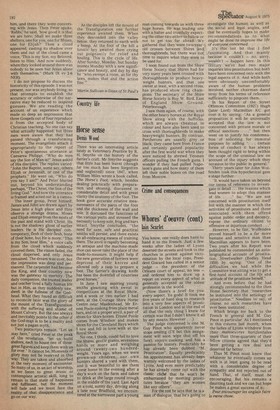Crime and consequences
Whores' d'oeuvre (cent)
lain Scarlet
You know, one really does have to hand it to the French. Just a few weeks after the ladies of Lyons deserted the streets and took to the churches in protest against victimisation by the local cops, President Giscard has called in a senior judge the president of the Orleans court of appeal, no less and ordered him to draw up a report on every aspect of what is generally accepted as the oldest: profession in the world. (Now there's a brief for you: every aspect. Ye gods! It took me five years of hard slog to research into a very few aspects of prostitution in London and at the end of all that the only thing I knew for certain was that I didn't know it all by any means. However . . .)
The judge concerned is one M. Guy Pinot who apparently never stops smiling (I'll bet this assignment will soon wipe that off his face), enjoys cooking and has a passion for history. Predictably he has already been dubbed "M. Prostitution". Equally predicatbly his appointment has already been warmly welcomed by the ladies of Lyons. And even more predictably he has already come out-with the classic cliche that he won't be embarrassed by meeting prostitutes because "they are women like any others".
For the rest he says that he is a man of dialogue, that he's going to
investigate the human as well as the social and legal angles, and that he eventually hopes to make recommendations as to -what might be done to improve the life of everyone concerned. It's this last bit that I find . fascinating. And that mainly because it couldn't no, sorry, wouldn't happen here. In this -6--entury we've had two major inquiries into prostitution but both have been concerned only with the legal aspects of it. And while both were obviously uncomfortably aware of the human problems involved, neither chairman dared stray from his terms of reference sufficiently to pinpoint them.
In his Report of the Street Offences Committee (1927) Hugh (later Lord) Macmillan KC got over it by saying: "As a general proposition it will be universally accepted that the law is not concerned with private morals or ethical sanctions . . ." but then went on to justify his condemnation of soliciting for immoral purposes by adding ". . . certain forms of conduct it has always been thought right to bring within the scope of the criminal law on account of the injury which they occasion to the public in general." Thirty years later Sir John Wolfenden took this hypothetical gem a stage further,
-It would have taken us beyond our •terms of reference, to investigate in detail . .. the reasons which lead women to adopt this manner
of life . ." So: "We are not concerned with prostitution itself but with the manner in which the activities of prostitutes and those associated with them offend against public order and decency, expose the ordinary citizen to offensive or injurious conduct. . ."
However, to be fair, Woffenden proved himself to be a far more humane and sensitive man than Macmillan appears to have been. Two years after his Report was published he commended an autobiographical account of prostitution, Streetwalker (Bodley Head 1959) by saying: "One of the difficulties we had while the Committee was sitting was to get a first-hand account of the lire and attitude of the prostitute herself."
And even before that he had strongly recommended to the then Home Secretary that "researches be instituted into the aetiology of prostitution." Needlass to say, of course, no such researches have ever been instituted .. .
Which brings me back to the French in general and M. Guy Pinot in particular. As I mentioned in this column last month, when the ladies of Lyons withdrew from their manoeuvres horilon tales more than three-quarters of their fellow citizens agreed that they'd been getting a raw deal and deserved far better.
Thus M. Pinot must know that whatever he eventually comes up with is at least going to be read with a considerable degree of sympathy and not rejected out of hand. That, of itself, must be encouraging. But his remains a daunting task and we can but hope he makes a great success of it: Pour.ericourager les anglais faire la rneme chose.


































 Previous page
Previous page